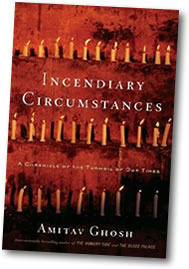
Incendiary Circumstances
Published in the USA by Houghton Mifflin
Publication Date: January 2006
320 pages
ISBN-10: 0618378065
ISBN-13: 9780618378067
Category: History, Science & Current Affairs
In a thirty-year career in journalism, Ghosh has written extraordinary firsthand accounts of catastrophic events in every part of the world. For the first time, Incendiary Circumstances brings together the finest of these pieces – many of them never published in the States – in a remarkable and compelling chronicle of the turmoil of our times.
Reviews
Incendiary Circumstances
New York Times book review by Alison McCulloch.
Published: February 5, 2006
The first essay in this collection of previously published writings by Ghosh, the Indian-born novelist and journalist, is the odd man out: the death and destruction elegantly described there is not the work of the repressive governments, terrorists and misguided ideologues wreaking havoc in much of the rest of the book, but of the motiveless walls of water that killed more than 185,000 people in the closing days of 2004. In his preface, Ghosh aims to tie the book’s 17 varied pieces together in a way that’s relevant to our post-9/11 sensibilities; he settles on how each speaks to the dangerous idea that “all possible means are permissible in the service of a desirable end.” But Ghosh does himself a disservice, since what is so appealing about these tales — most of which predate 9/11 — is how they let us see a world we no longer have access to, a world not everywhere and always refracted through the 9/11 lens. The power of Ghosh’s accounts, which range over topics that include repression in Myanmar, the assassination of Indira Gandhi and the strengths and weaknesses of Arab literature, comes from the time he spends with the unsung. These are ordinary people caught up in the unthinkable — like Chea Samy, a Cambodian dancer who, three years after being sent to work in rice fields during the Khmer Rouge madness, saw a poster of the man party workers said was their leader, Pol Pot, and realized he was her brother-in-law. She had known him as Saloth Sar, a young boy who she said “never gave me any trouble at all.”
Incendiary Circumstances
Review published no www.curledup.com
by Ram Subramanian, 2007.
With a gentleness of writing that belies a sharply observant eye, the seventeen essays in this collection offer a trenchant view of the world as seen through the perspective of Amitav Ghosh. Ghosh, who has a doctorate in social anthropology, teaches at Harvard and is a novelist of no small repute. The essays here run the gamut from the effects of natural (the south Asian tsunami of 2004) and man-made disasters (the September 11, 2001 attack on the World Trade Center) on ordinary people to personal friendship (with the Kashmiri poet Agha Shahid Ali) and travel in the U.S. The theme that holds these informed and deeply felt pieces together is the role of the everyman who is caught in events much larger than himself and yet is not completely helpless in the event’s aftermath.
When the tsunami hit parts of south Asia in December 2004, the islands of Andaman and Nicobar (governed by India and 435 miles from its southern-most tip) bore the full brunt of the swirling waves and the violent winds. While residents lost property and their means of livelihood, Ghosh’s “The Town by the Sea” examines the plight of islanders who have lost their papers – the documents that, to the immigrants who settled on these islands, denoted identity and security.
The aftermath of the September 11 attacks is seen through the eyes of a brave wife and mother who loses her husband to the tragedy. Tragedy and danger strike a personal note in “The Ghosts of Mrs. Gandhi,” where the author finds himself defending a Sikh neighbor who is about to feel the wrath of Hindus intent on exacting revenge on all Sikhs for the murder of India’s prime minister at the hands of her Sikhs guards.
In all the essays, the author’s observant eye, his strategy of letting the event and the people take center stage, and his lapidary prose offer a gentle yet telling perspective of these times. Not a single essay lacks erudition and thought. All of them pack a punch in what they portray, although Ghosh’s writing in and of itself is gentle and evenly paced. The author of well-received novels such as The Shadow Lines and The Glass Palace shows his range as an essayist in this fine collection.
